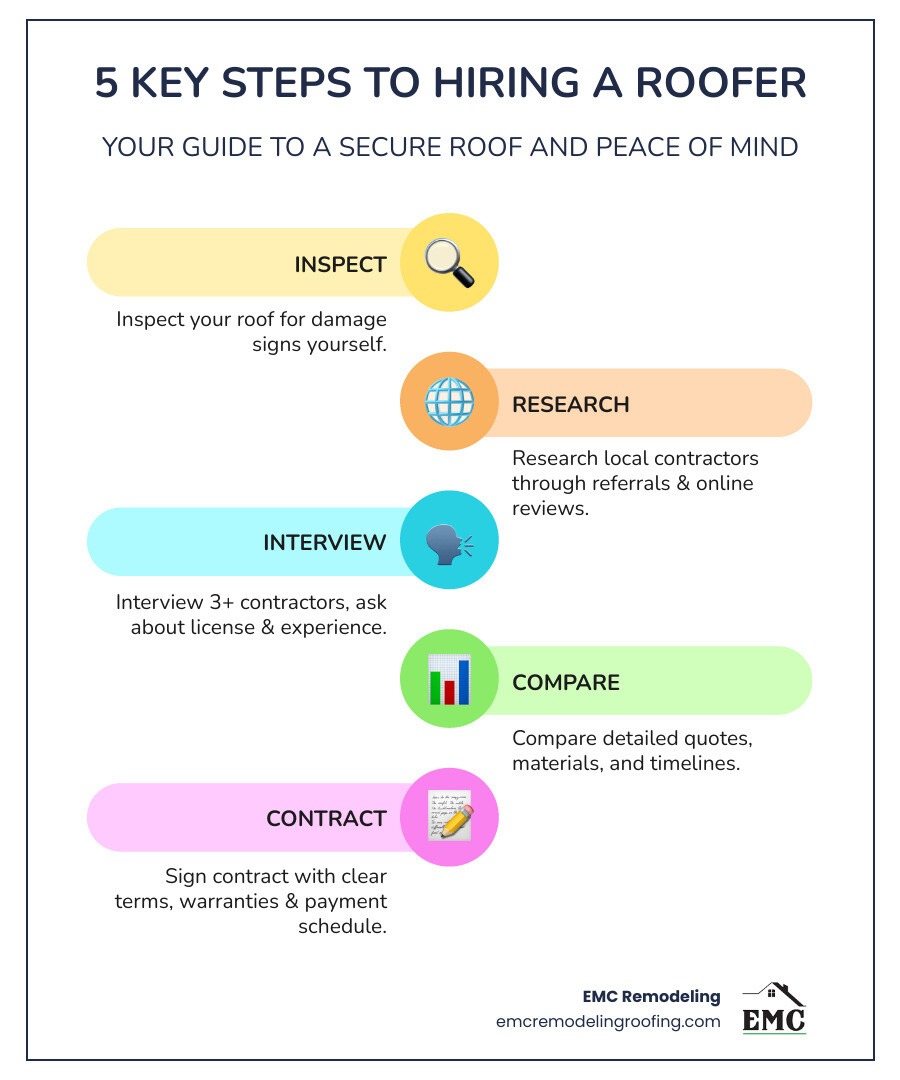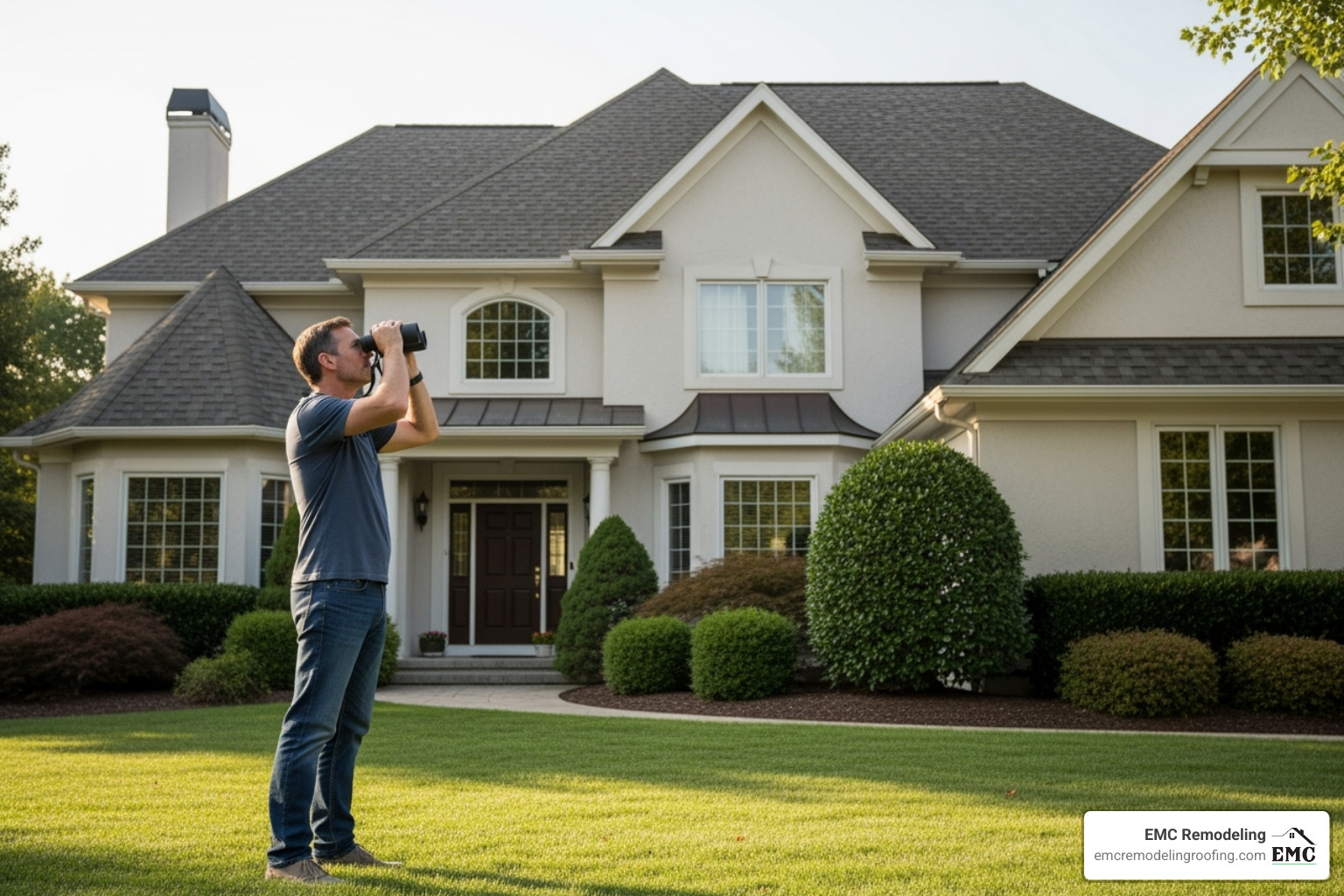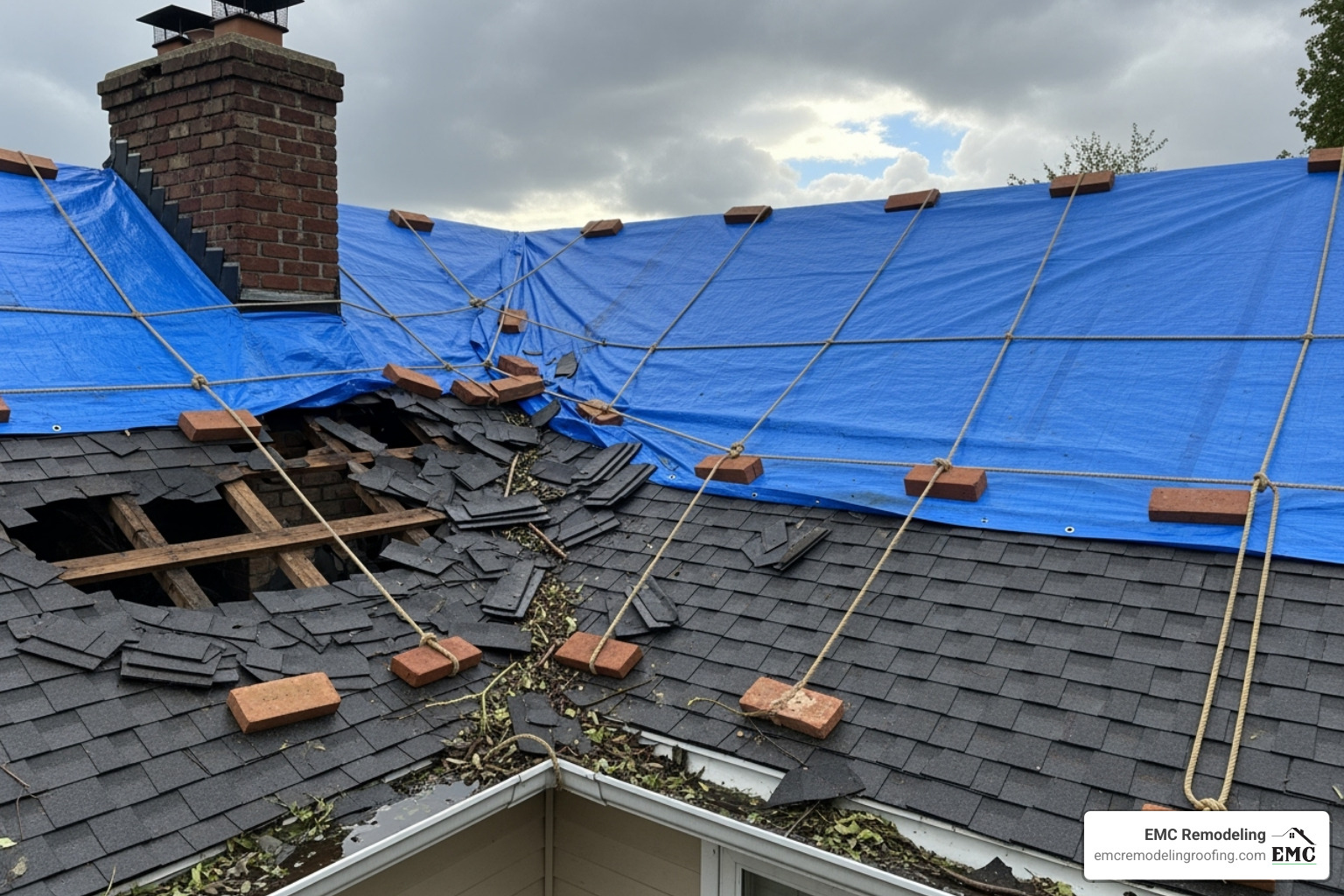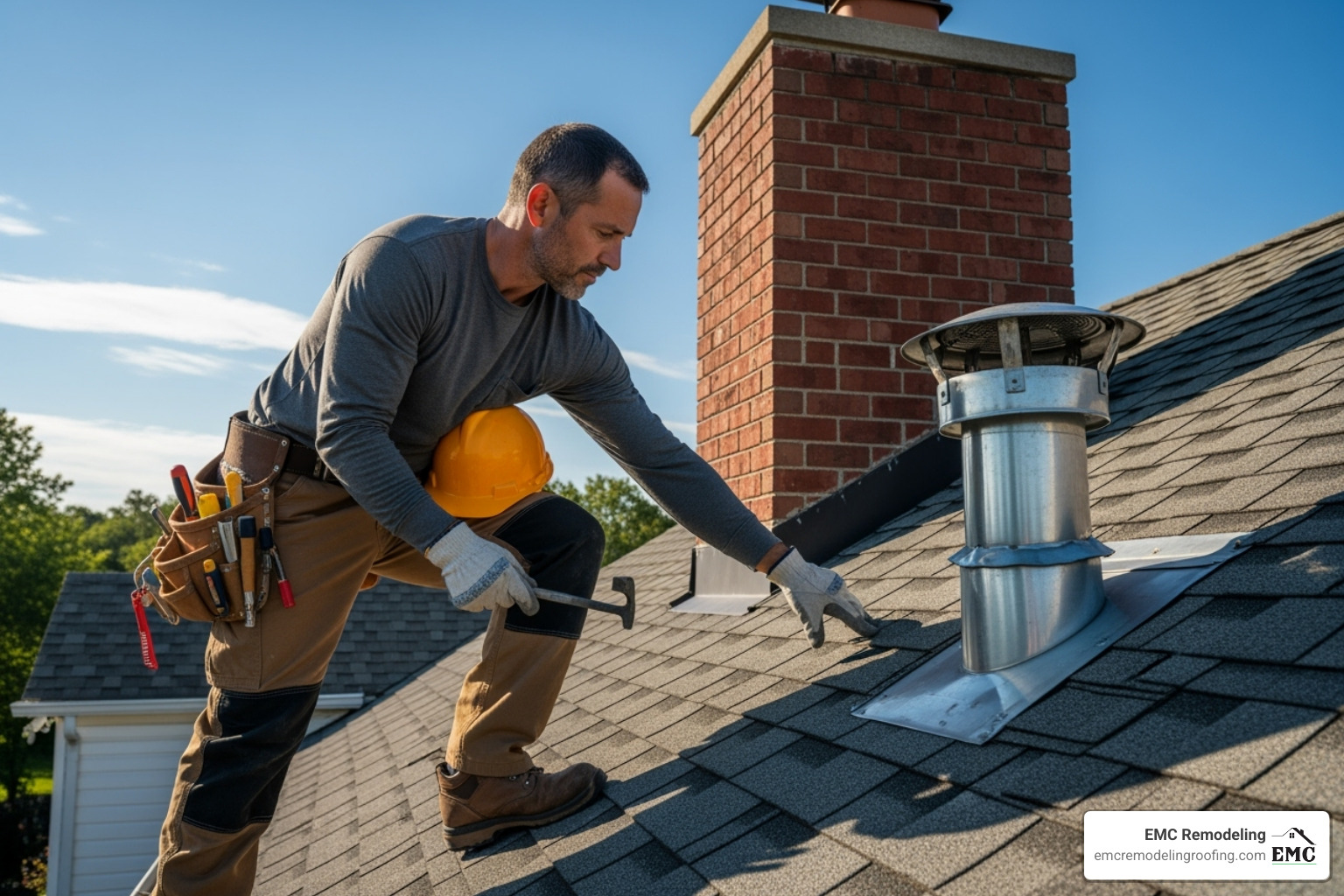Your Guide to a Secure Roof and Peace of Mind
Finding reliable roofers in my area can feel overwhelming. Your roof protects your family and investment, yet finding honest contractors who deliver quality work at fair prices is a major challenge for homeowners. With roofing scams on the rise, it’s crucial to know how to spot legitimate professionals.
This guide will help you hire a local roofing partner you can trust. We’ll cover everything from identifying repair needs to navigating insurance claims, empowering you to make informed decisions.
Quick Guide to Finding Local Roofers:
- Start with referrals from neighbors, friends, and local building supply stores.
- Verify credentials like licenses, insurance, and manufacturer certifications.
- Check online reviews on platforms like BBB, Google, and Nextdoor.
- Get multiple quotes from at least 3-5 contractors.
- Ask key questions about experience, warranties, and timelines.
- Avoid red flags such as door-to-door solicitors or demands for full payment upfront.
I’m Matthew Runyon, President of EMC Remodeling & Roofing. With over 15 years of experience serving Central Texas, I’ve learned what separates great contractors from the rest. Let’s get you started.

Important roofers in my area terms:
Is It Time for a Repair? 7 Telltale Signs Your Roof Needs Attention
Your roof works 24/7, but it doesn’t last forever. Knowing the warning signs can help you find roofers in my area before minor issues become major disasters. Your roof often gives clear signals when it needs help.

Here are seven signs that it’s time to take action:
- Roof Age: Most asphalt shingle roofs last 20-25 years. If yours is approaching this age, it’s time for a professional inspection.
- Water Stains: Brown or yellow stains on ceilings or in the attic are clear indicators of a leak, even if the source isn’t directly above the stain.
- Missing or Damaged Shingles: Look for shingles that are curling, cracked, buckled, or missing entirely. These are weak spots vulnerable to wind and rain.
- Granules in Gutters: Finding excessive sand-like granules in your gutters means your shingles are losing their protective layer against UV rays and weather.
- Sagging Roof Deck: Any dips or curves in your roofline are a serious red flag for structural damage. Do not ignore this.
- Damaged Flashing: The metal strips around chimneys, vents, and skylights are critical. If they are cracked, rusted, or loose, water can easily get in.
- Light in the Attic: If you can see daylight through your roof boards, you have direct entry points for water.
Spotting these signs means it’s time for a roof repair or replacement. Addressing them early prevents more expensive damage later.
Roof Overlay vs. Full Replacement: What’s the Difference?
When your roof needs work, you’ll choose between an overlay or a full replacement.
- A roof overlay installs new shingles over the existing layer. It’s faster and cheaper but can hide underlying problems like deck rot. It’s only an option if you have a single layer of shingles and a sound structure.
- A full replacement strips the roof to its deck and rebuilds it with all new materials. While it costs more upfront, it allows for a thorough inspection, addresses all issues, and is often required for manufacturer warranties.
A full replacement offers peace of mind and long-term value. For more details, see our Complete Roof Replacement Guide. A full replacement protects your home for decades.
Your Vetting Checklist: How to Find Reputable Roofers in My Area
Finding skilled and honest roofers in my area is the key to a successful project. Properly vetting contractors saves you from future stress and expense. A local contractor is invaluable, as they understand Central Texas weather, know local building codes, and have a community reputation to uphold.

Where to Start Your Search
Begin by gathering a list of potential contractors from reliable sources:
- Personal Referrals: Ask neighbors, friends, and other trade professionals for recommendations. First-hand experience is often the most trustworthy.
- Online Reviews: Use platforms like Google, Nextdoor, and the Better Business Bureau (BBB) to gauge a contractor’s reputation. Look for A+ ratings and check how they resolve complaints.
- Local Resources: Check with local building supply stores, which often recommend contractors they know and trust. For targeted results, search for roofers in Temple, TX or your specific town.
Verifying Credentials: The Non-Negotiables
Once you have a shortlist, verify these essential credentials. This step is crucial to protect yourself from unqualified operators.
- Proof of License: Ensure the contractor is licensed to work in your state. You can often verify this online, for example, through the Contractors State License Board in California. Ask for their license number and check it.
- General Liability Insurance: This protects your property from damage caused by the contractor. Without it, you could be liable for repairs.
- Worker’s Compensation Insurance: This covers workers if they are injured on your property, protecting you from liability. Always ask for certificates of insurance and verify them with the provider.
- Manufacturer Certifications: Certifications from brands like GAF show that a contractor has been trained to install products correctly, which is often necessary to validate the material warranty.
The Interview: 10 Critical Questions to Ask Before You Hire
After vetting your list of potential roofers in my area, the interview is your chance to evaluate their professionalism and expertise. Plan to interview at least three contractors to compare not just prices, but communication and knowledge.
Ask these critical questions:
- Are you licensed and insured for work in this state? (Ask for proof.)
- How long have you been in business and what is your experience with projects like mine?
- Will your employees or subcontractors do the work? If subs, how are they vetted?
- Can you provide references from recent clients? (Be sure to call them.)
- What specific materials do you recommend for my roof and why?
- What warranties do you offer on materials and workmanship?
- Will you provide a detailed, itemized quote covering all costs?
- What is the estimated project timeline and how are potential delays handled?
- How will you protect my property and what is your cleanup process?
- What are your payment terms and schedule?
Clear communication is vital. A contractor who is responsive and clear during the bidding process is likely to remain so throughout the project.
Understanding the Contract and Warranties
A solid contract is your project’s roadmap. Ensure it includes:
- Itemized Quote: A full breakdown of costs for materials, labor, permits, and disposal.
- Payment Schedule: A reasonable down payment (e.g., 10-25%) with subsequent payments tied to project milestones. Never pay in full upfront.
- Project Timeline: Clear start and completion dates, with a protocol for handling delays.
- Debris Removal: A plan for complete cleanup after the job is done.
- Warranties: Understand the difference between the contractor’s workmanship warranty (covers installation) and the manufacturer’s material warranty (covers product defects). Reviewing customer testimonials can also provide insight into a contractor’s reliability.
Red Flags to Watch For
Avoid contractors who exhibit these warning signs:
- Demand cash or full payment upfront.
- Provide an extremely low quote, which may indicate inferior materials or cut corners.
- Use high-pressure sales tactics.
- Communicate poorly during the bidding process.
- Appear as door-to-door salespeople immediately after a storm, as they may be untrustworthy “storm chasers.”
A professional roofer will have a local physical address and a portfolio of past work. Our office at 5100 Midway Dr Suite 211, Temple, TX 76502 demonstrates our commitment to the Central Texas community and our clients needing reliable roofing services.
Decoding the Costs and Materials: What to Expect for Your Project
Understanding roofing costs helps you budget wisely and make smart decisions. Costs vary based on your home’s size, roof complexity, and material choice. Generally, labor accounts for about 60% of the total project cost, reflecting the skill required for a quality installation.
- Roof Repairs: Typically cost between $386 and $1,875, depending on the extent of the damage.
- Roof Replacement: A larger investment, ranging from $5,890 to $12,800 for an average-sized home.
- Professional Inspections: Cost around $235 and are a worthwhile investment for early problem detection.
| Material | Lifespan (Years) | Average Cost (per sq ft installed) | Key Benefits |
|---|---|---|---|
| Asphalt Shingles | 20-25 | $3.50 – $5.50 | Affordable, wide variety of colors/styles, easy installation |
| Metal Roofing | 40-70 | $8.00 – $16.00 | Durable, energy-efficient, resistant to fire/wind, long-lasting |
| Tile (Clay/Concrete) | 50-100+ | $10.00 – $25.00 | Aesthetic appeal, extreme durability, fire resistance |
(Note: Costs are estimates and can vary based on location, roof complexity, and specific product choices.)
Choosing the Right Material for Your Home
Matching materials to your home’s style, budget, and the Central Texas climate is key.
- Asphalt Shingles: The most popular choice due to affordability and versatility. They last 20-25 years and come in many styles.
- Metal Roofing: A durable, long-term investment. Metal roofing systems last 40-70 years, withstand high winds, and are energy-efficient, which helps lower cooling costs in Texas.
- Solar Roofing: Integrates solar technology directly into your shingles. Systems like GAF’s Timberline Solar® are best installed during a planned roof replacement, streamlining the roof installation and reducing future energy bills.
- Premium Materials: Tile, slate, and wood shake offer unique aesthetics and superior longevity but come at a higher price point and may require more maintenance.
Choosing the right material is about balancing upfront cost with long-term value. Quality materials installed by professional roofers in my area are a better investment than the cheapest option.
After the Storm: A Homeowner’s Guide to Emergency Repairs & Insurance Claims
Severe weather in Central Texas can be sudden and destructive. After a storm, it’s easy to feel overwhelmed. The key is to act quickly and safely.

Your first priority is safety. Check on your family and evacuate if you see major structural damage. Never climb on a wet or damaged roof yourself; it’s extremely dangerous. Leave inspections to professionals.
From the ground, document all visible damage with photos and videos. Capture images of missing shingles, dented gutters, and any interior leaks. This documentation is crucial for your insurance claim.
If your roof is actively leaking, temporary tarping can prevent further damage. Our 24/7 emergency services are available to secure your roof quickly, giving you time to steer the insurance process without additional water damage.
Navigating the Insurance Claim Process
Dealing with insurance can be complex, but a methodical approach helps. Here are the key steps:
- Contact Your Agent Promptly: Report the damage to your insurance company as soon as possible. Have your photos ready.
- Understand Your Policy: Review your coverage for storm damage, your deductible, and whether you have replacement cost vs. actual cash value coverage.
- Schedule the Adjuster Visit: Have your chosen roofing contractor present during the insurance adjuster’s inspection. An experienced roofer can point out damage that might otherwise be missed, especially subtle hail impacts.
An expert in Hail Damage Roof Repair can ensure all damage is properly identified. Reputable roofers in my area often provide Insurance Roof Claims assistance, helping you translate technical findings for the adjuster and advocating on your behalf. Thorough documentation and professional expertise are your best assets for a successful claim.
Proactive Care: How to Maximize Your Roof’s Lifespan
Regular maintenance can significantly extend your roof’s life and help you avoid costly premature replacements. A small investment in proactive care pays dividends for years.

Follow these simple maintenance tips:
- Get Annual Inspections: A professional can spot subtle issues like loose flashing or granule loss before they become major problems. Schedule a roof inspection in the spring or fall.
- Clean Your Gutters: Clogged gutters cause water to back up under shingles, leading to rot. Clean them regularly, especially in the fall.
- Remove Debris: Don’t let leaves and twigs sit on your roof, as they trap moisture and promote moss or algae growth.
- Trim Overhanging Branches: Keep tree branches at least 10 feet from your roofline to prevent scraping damage and reduce the risk of falling limbs during storms.
- Address Small Problems Immediately: A single loose shingle is an entry point for water. Prompt, minor repairs prevent major expenses.
Your Local Roofing Partner in Central Texas
For reliable maintenance and repairs, you need trusted local roofers in my area. At EMC Remodeling, we’ve served Central Texas for over 15 years, understanding the unique challenges of our climate. Our family-operated business prides itself on owner involvement in every project, whether you’re in Temple, Killeen, or a surrounding community. For an unbiased assessment, you can also find certified inspectors through the National Roof Certification and Inspection Association (NRCIA).
Ready to protect your investment? Contact us for a free consultation.
EMC Remodeling
Address: 5100 Midway Dr Suite 211, Temple, TX 76502
Phone: (254) 760-9268
Conclusion: Hire with Confidence and Protect Your Investment
Finding trustworthy roofers in my area is achievable when you’re equipped with the right knowledge. This guide provides a clear roadmap to help you hire with confidence and avoid common pitfalls. Your roof is your home’s primary defense against the elements and a critical part of its value.
The time you invest in researching contractors, verifying credentials, asking tough questions, and securing a solid contract is an investment in your peace of mind. Choosing an experienced professional who uses quality materials and offers strong warranties protects your family and your finances.
Due diligence is what separates a successful roofing project from a costly mistake. Don’t let the process intimidate you. Legitimate, skilled contractors are ready to earn your trust through transparency and craftsmanship.
When you need routine maintenance, storm damage assistance, or a full replacement, choose a local partner with deep community roots. For expert guidance and reliable service for your roofing repair needs, select a contractor who will treat your home with the care it deserves.
